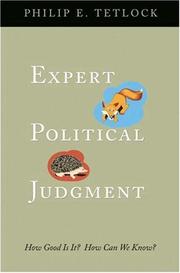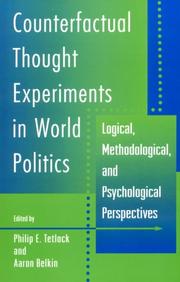| Listing 1 - 10 of 22 | << page >> |
Sort by
|
Book
ISBN: 9781400888818 Year: 2017 Publisher: Princeton, NJ
Abstract | Keywords | Export | Availability | Bookmark
 Loading...
Loading...Choose an application
- Reference Manager
- EndNote
- RefWorks (Direct export to RefWorks)

ISBN: 0691123020 9780691123028 9780691128719 0691128715 Year: 2005 Publisher: Princeton, N.J. Princeton University Press
Abstract | Keywords | Export | Availability | Bookmark
 Loading...
Loading...Choose an application
- Reference Manager
- EndNote
- RefWorks (Direct export to RefWorks)
Political philosophy. Social philosophy --- Sociology of culture --- Psycholinguistics --- Social psychology --- Politics --- Psychology

ISBN: 0691123020 9780691123028 9780691128719 0691128715 1282259172 1400830311 9786612259173 Year: 2006 Publisher: Princeton, N.J. Princeton University Press
Abstract | Keywords | Export | Availability | Bookmark
 Loading...
Loading...Choose an application
- Reference Manager
- EndNote
- RefWorks (Direct export to RefWorks)
Political philosophy. Social philosophy --- Psychology --- Social psychology --- Sociology of culture --- Politics --- Psycholinguistics
Book
ISBN: 9781847947154 Year: 2016 Publisher: London Random House Books
Abstract | Keywords | Export | Availability | Bookmark
 Loading...
Loading...Choose an application
- Reference Manager
- EndNote
- RefWorks (Direct export to RefWorks)

ISBN: 0691123020 9780691123028 9780691128719 0691128715 Year: 2005 Publisher: Princeton, N.J. Princeton University Press
Abstract | Keywords | Export | Availability | Bookmark
 Loading...
Loading...Choose an application
- Reference Manager
- EndNote
- RefWorks (Direct export to RefWorks)
Political philosophy. Social philosophy --- Psychology --- Social psychology --- Sociology of culture --- Politics --- Psycholinguistics
Book
ISBN: 9781847947147 Year: 2015 Publisher: London Random House
Abstract | Keywords | Export | Availability | Bookmark
 Loading...
Loading...Choose an application
- Reference Manager
- EndNote
- RefWorks (Direct export to RefWorks)
Multi
ISBN: 9781400888818 9780691175973 Year: 2017 Publisher: Princeton, N.J. Princeton University Press
Abstract | Keywords | Export | Availability | Bookmark
 Loading...
Loading...Choose an application
- Reference Manager
- EndNote
- RefWorks (Direct export to RefWorks)
Book
ISBN: 9781400830312 Year: 2009 Publisher: Princeton, NJ
Abstract | Keywords | Export | Availability | Bookmark
 Loading...
Loading...Choose an application
- Reference Manager
- EndNote
- RefWorks (Direct export to RefWorks)

ISBN: 0691027919 0691027927 0691215073 Year: 1996 Publisher: Princeton, N.J. Princeton University Press
Abstract | Keywords | Export | Availability | Bookmark
 Loading...
Loading...Choose an application
- Reference Manager
- EndNote
- RefWorks (Direct export to RefWorks)
Political scientists often ask themselves what might have been if history had unfolded differently: if Stalin had been ousted as General Party Secretary or if the United States had not dropped the bomb on Japan. Although scholars sometimes scoff at applying hypothetical reasoning to world politics, the contributors to this volume--including James Fearon, Richard Lebow, Margaret Levi, Bruce Russett, and Barry Weingast--find such counterfactual conjectures not only useful, but necessary for drawing causal inferences from historical data. Given the importance of counterfactuals, it is perhaps surprising that we lack standards for evaluating them. To fill this gap, Philip Tetlock and Aaron Belkin propose a set of criteria for distinguishing plausible from implausible counterfactual conjectures across a wide range of applications. The contributors to this volume make use of these and other criteria to evaluate counterfactuals that emerge in diverse methodological contexts including comparative case studies, game theory, and statistical analysis. Taken together, these essays go a long way toward establishing a more nuanced and rigorous framework for assessing counterfactual arguments about world politics in particular and about the social sciences more broadly.
International relations. Foreign policy --- Methods in social research (general) --- History as a science --- World politics. --- History --- Counterfactuals (Logic) --- Thought experiments. --- Philosophy. --- World politics --- -Counterfactuals (Logic) --- Thought experiments --- #SBIB:327H03 --- #SBIB:327.1H10 --- Experiments, Thought --- Methodology --- Contrary-to-fact conditional --- Counterfactual conditionals --- Conditionals (Logic) --- Logic --- Annals --- Auxiliary sciences of history --- Colonialism --- Global politics --- International politics --- Political history --- Political science --- World history --- Eastern question --- Geopolitics --- International organization --- International relations --- Philosophy --- Internationale betrekkingen: onderwijs en onderzoek --- Internationale betrekkingen: theorieën --- Counterfactuals (Logic). --- History, Modern --- Gedankenexperiment --- Internationale Politik --- Weltpolitik --- Azerbaijan crisis. --- Bay of Pigs. --- Goldstone, Jack. --- Halifax, Lord. --- Iranian revolution. --- Jowitt, Ken. --- Khrushchev, N. --- Leninism. --- Napoleon. --- Nash equilibrium. --- Qavam. --- Riser, E. --- Russian revolution. --- Stalinism. --- Thucydides. --- data scarcity. --- experimental method. --- hindsight. --- legitimacy issues. --- moral catastrophes. --- nomothetic counterfactuals. --- optimality constraints. --- perfect equilibrium. --- policy makers. --- proximity criterion. --- reification. --- structuralism. --- tripolar world. --- Politique mondiale --- Histoire --- Contrefactuel (logique) --- Pensée --- philosophie --- expériences --- Weltordnungspolitik --- Politik --- Internationale Beziehungen --- Politische Beziehungen --- Zwischenstaatliche Beziehungen --- Außenpolitik --- Internationales politisches System --- Experiment --- Pensée --- expériences
Book
ISBN: 9789047006534 Year: 2015 Publisher: Amsterdam Business Contact
Abstract | Keywords | Export | Availability | Bookmark
 Loading...
Loading...Choose an application
- Reference Manager
- EndNote
- RefWorks (Direct export to RefWorks)
Veel van onze beslissingen worden gestuurd door verwachtingen over de toekomst. Of je nu beleidsmaker bent, op de beurs handelt, een product wilt lanceren of een carrièreswitch overweegt, je doet voorspellingen. Het probleem is: we zijn niet erg goed in voorspellen.Hoogleraar psychologie Philip Tetlock kwam na jarenlang onderzoek tot de schokkende ontdekking dat de gemiddelde futuroloog maar een fractie beter presteert dan een aap die een pijltje gooit. Tetlocks laatste project (een ongeëvenaard voorspellingstoernooi met ruim een miljoen grote en kleine voorspellingen) toont aan dat er echter weldegelijk mensen zijn die het bij het juiste eind blijken te hebben maar juist niet de experts. Het zijn gewone mensen die in staat bleken om juiste voorspellingen te doen, soms wel 60% preciezer dan gemiddeld. Zij zijn de supervoorspellers.In dit baanbrekende boek laten Philip Tetlock en Dan Gardner zien wat we van hen kunnen leren. Een paar suggesties: veel informatiebronnen gebruiken, denken in waarschijnlijkheden, goed luisteren naar anderen en bereid zijn om terug te komen op een eerdere uitspraak. De auteurs leveren hiermee de eerste aantoonbaar effectieve methode om beter te voorspellen voor ondernemers, analisten, beleidsmakers en iedereen die meer grip op zijn leven wil krijgen.Bron : http://www.businesscontact.nl
Behavioral sciences --- Cognitieve psychologie --- Cognitive psychology --- Economic forecasting --- Economische vooruitzichten --- Forecasting --- Perspective économique --- Projection économique --- Prévision --- Prévision économique --- Prévisions économiques --- Psychologie [Cognitieve ] --- Psychologie cognitive --- Psychology [Cognitive ] --- Science sociale --- Sciences [Social ] --- Sciences sociales --- Social science --- Social sciences --- Social studies --- Sociale wetenschap --- Sociale wetenschappen --- Voorspelling --- Toekomstbeeldvorming --- Trends --- Trendwatching --- Economics --- Economic development --- Toekomstvisie --- Trend
| Listing 1 - 10 of 22 | << page >> |
Sort by
|

 Search
Search Feedback
Feedback About UniCat
About UniCat  Help
Help News
News